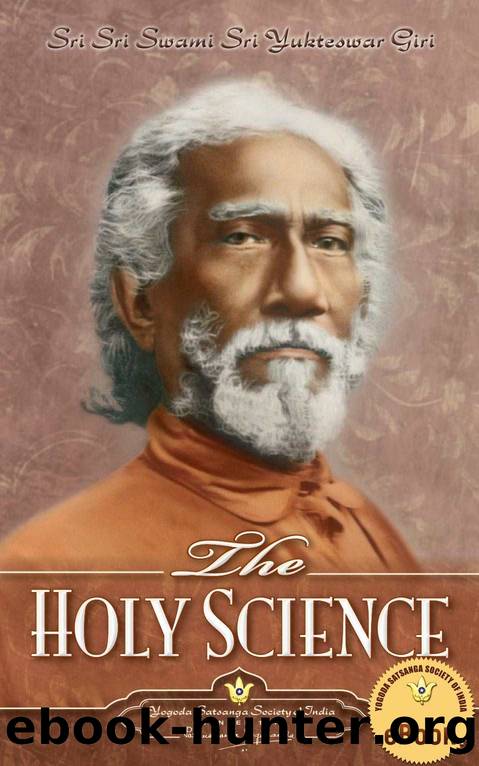The Holy Science by Giri Swami Sri Yukteswar

Author:Giri, Swami Sri Yukteswar [ Giri, Swami Sri Yukteswar]
Language: eng
Format: epub
ISBN: 93-83203-74-9
Publisher: Yogoda Satsanga Society of India
Published: 2017-10-24T00:00:00+00:00
Hence bondage disappears.
The eight bondages or snares are hatred, shame, fear, grief, condemnation, race prejudice, pride of family, and smugness.
(Removal of the eight bondages) leads to magnanimity of heart.
Thus one becomes fit to practice Asana, Pranayama, and Pratyahara; and to enjoy the householderâs life (by fulfilling all oneâs desires and so getting rid of them).
Asana means a steady and pleasant posture of the body.
Pranayama means control over prana, life force.
Pratyahara means withdrawal of the senses from external objects.
The eight meannesses of the heart. Firmness of moral courage, when attained, removes all the obstacles in the way of salvation. These obstacles are of eight sortsâhatred, shame, fear, grief, condemnation, race prejudice, pride of pedigree, and a narrow sense of respectabilityâwhich eight are the meannesses of the human heart.
Awakening magnanimity of the heart. By the removal of these eight obstacles, Viratwam or Mahattwam (magnanimity of the heart) comes in, and this makes man fit for the practice of Asana (remaining in steady and pleasant posture), Pranayama (control over prana, involuntary nerve electricities), and Pratyahara (changing the direction of the voluntary nerve currents inward). These practices enable man to satisfy his heart by enjoying the objects of the senses as intended for Garhasthyasrama (domestic) life.
Value of Pranayama. Man can put the voluntary nerves into action whenever he likes, and can give them rest when fatigued. When all of these voluntary nerves require rest he sleeps naturally, and by this sleep the voluntary nerves, being refreshed, can work again with full vigour. Manâs involuntary nerves, however, irrespective of his will, are working continuously of themselves from his birth. As he has no control over them, he cannot interfere with their action in the least. When these nerves become fatigued they also want rest and naturally fall asleep. This sleep of the involuntary nerves is called Mahanidra, the great sleep, or death. When this takes place, the circulation, respiration, and other vital functions being stopped, the material body naturally begins to decay. After a while, when this great sleep Mahanidra is over, man awakes, with all his desires, and is reborn in a new physical body for the accomplishment of his various yearnings. In this way man binds himself to life and death and fails to achieve final salvation.
Control over death. But if man can control these involuntary nerves by the aforesaid Pranayama, he can stop the natural decay of the material body and put the involuntary nerves (of the heart, lungs, and other vital organs) to rest periodically, as he does with his voluntary nerves in sleep. After such rest by Pranayama the involuntary nerves become refreshed and work with newly replenished life.
As after sleep, when rest has been taken by the voluntary nerves, man requires no help to awaken naturally; so after death also, when man has enjoyed a full rest, he awakens naturally to life in a new body on earth. If man can âdie,â that is, consciously put his entire nervous system, voluntary and involuntary, to rest each day by practice of Pranayama, his whole physical system works with great vigour.
Download
This site does not store any files on its server. We only index and link to content provided by other sites. Please contact the content providers to delete copyright contents if any and email us, we'll remove relevant links or contents immediately.
Fingersmith by Sarah Waters(2004)
Kundalini by Gopi Krishna(1820)
The Bhagavad Gita by Bibek Debroy(1664)
Indian Mythology by Devdutt Pattanaik(1618)
Wheels of Life by Anodea Judith(1599)
The Yoga of Jesus: Understanding the Hidden Teachings of the Gospels by Paramahansa Yogananda(1522)
The Man from the Egg by Sudha Murty(1498)
Autobiography of a Yogi (Complete Edition) by Yogananda Paramahansa(1485)
Chakra Mantra Magick by Kadmon Baal(1382)
The Book of Secrets: 112 Meditations to Discover the Mystery Within by Osho(1348)
Avatar of Night by Tal Brooke(1254)
The Sparsholt Affair by Alan Hollinghurst(1242)
Sparks of Divinity by B. K. S. Iyengar(1226)
Karma-Yoga and Bhakti-Yoga by Swami Vivekananda(1217)
The Bhagavad Gita (Classics of Indian Spirituality) by Eknath Easwaran(1205)
Gandhi by Ramachandra Guha(1191)
The Spiritual Teaching of Ramana Maharshi by Ramana Maharshi(1170)
Skanda Purana (Great Epics of India: Puranas Book 13) by Bibek Debroy & Dipavali Debroy(1137)
Hinduism: A Very Short Introduction (Very Short Introductions) by Knott Kim(1115)
